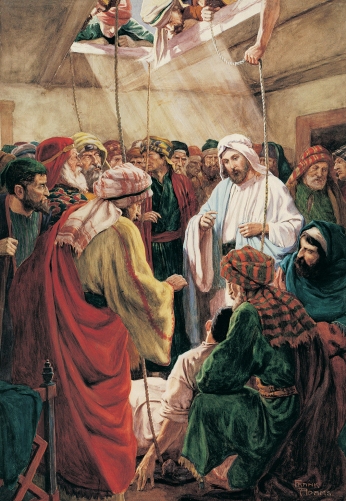Here is another of my question-and-answer articles, on the topic of devotion to the angels. I hope you enjoy it.
We don’t hear much about angels anymore, even though the Church celebrates two feasts in their honour. Is devotion to the angels still important?
Devotion to the angels is very important. It has always been. As you say, the Church celebrates two feasts in their honour: on September 29 the feast of the Archangels Michael, Gabriel and Raphael, and on October 2 the feast of the Guardian Angels. Those feasts can be an occasion for priests to preach on the importance of the angels in our lives, for parents to teach their children about them, and for all of us to grow in devotion to them.
 The angels appear throughout the Scriptures. To mention just a few, already in the first book of the Bible, angels are placed at the entrance of the garden of Eden to guard the tree of life (Gen 3:24), and an angel appears to Jacob, telling him to return to the land of his birth (cf. Gen 31:11-13). Also in the Old Testament, an angel appears to Manoah’s wife announcing the birth of Samson (cf. Judg 13:3) and the Archangel Raphael accompanies the young Tobias on a journey in the book of Tobit. In the New Testament an angel appears to St Joseph in a dream to tell him that the child Mary is carrying is of the Holy Spirit (cf. Mt 1:20); and the Archangel Gabriel appears both to Zechariah to announce the birth of John the Baptist (cf. Lk 1:11) and to Mary to announce the birth of Jesus (cf. Lk 1:26-31). Finally, in the last book of the Bible, the book of Revelation, angels appear numerous times giving glory to God.
The angels appear throughout the Scriptures. To mention just a few, already in the first book of the Bible, angels are placed at the entrance of the garden of Eden to guard the tree of life (Gen 3:24), and an angel appears to Jacob, telling him to return to the land of his birth (cf. Gen 31:11-13). Also in the Old Testament, an angel appears to Manoah’s wife announcing the birth of Samson (cf. Judg 13:3) and the Archangel Raphael accompanies the young Tobias on a journey in the book of Tobit. In the New Testament an angel appears to St Joseph in a dream to tell him that the child Mary is carrying is of the Holy Spirit (cf. Mt 1:20); and the Archangel Gabriel appears both to Zechariah to announce the birth of John the Baptist (cf. Lk 1:11) and to Mary to announce the birth of Jesus (cf. Lk 1:26-31). Finally, in the last book of the Bible, the book of Revelation, angels appear numerous times giving glory to God.
Angels are real, and they were created by God to give him glory in heaven as well as to perform various roles on earth, including looking after human beings as guardian angels. I don’t know how much the average person hears about angels these days, but I suspect, as you say, that it is not much. This is sad. Why is devotion to the angels so important?
A first reason is quite general but fundamental. In recent times mankind has tended to focus more and more on the visible world, on the here below, and to forget the spiritual, the supernatural. But it is in the realm of the spiritual where God himself is, and where our ultimate destiny, heaven, is. And it is in that realm too where angels, who are invisible, are. Remembering the angels and having devotion to them thus helps to lift our thoughts above and to be heavenly minded, not earthly minded (cf. Col 3:1-2).
What is more, all the angels, not only the guardian angels, are with us in the Church. St Thomas Aquinas writes: “It is manifest that both men and angels are ordained to one end, which is the glory of the divine fruition. Hence the Mystical Body of the Church consists not only of men but also of angels” (STh III, q. 8). So angels too form part of the Church. We can call on them to help us be the saints God wants us to be and so build up the body of Christ, the Church, helping others too to grow in holiness.
We should not forget either that the angels constantly adore Our Lord in the Tabernacle, where Christ is truly present. When we go into a church we can ask the angels to help us adore Our Lord as they do. We don’t see the angels but they are truly there, day and night. When we can’t be there ourselves, we can ask them to keep Our Lord company on our behalf. And, of course, during the celebration of Mass, the angels surround Our Lord when he becomes present in the host and in the chalice. Awareness of this helps us to be more supernatural, more spiritually minded.
Tabernacle, where Christ is truly present. When we go into a church we can ask the angels to help us adore Our Lord as they do. We don’t see the angels but they are truly there, day and night. When we can’t be there ourselves, we can ask them to keep Our Lord company on our behalf. And, of course, during the celebration of Mass, the angels surround Our Lord when he becomes present in the host and in the chalice. Awareness of this helps us to be more supernatural, more spiritually minded.
Awareness of the existence of our guardian angel is also very helpful. When we are tempted to sin or are in any difficult set of circumstances we can ask our angel to help us get through the situation successfully. And being aware that our angel is always there watching us can be an added help to avoid doing things that we wouldn’t want our angel to see. St John Vianney, the Curé of Ars, writes: “If we did like St Remigius, we would never be angry. See, this saint, being questioned by a Father of the desert how he managed to be always in an even temper, replied: ‘I often consider that my guardian angel is always by my side’”. He also says: “The devil writes down our sins, our guardian angel all our merits. Labour so that guardian angel’s book may be full, and the devil’s empty.”
So yes, devotion to the angels is very important. Let us do all we can to foster it.

